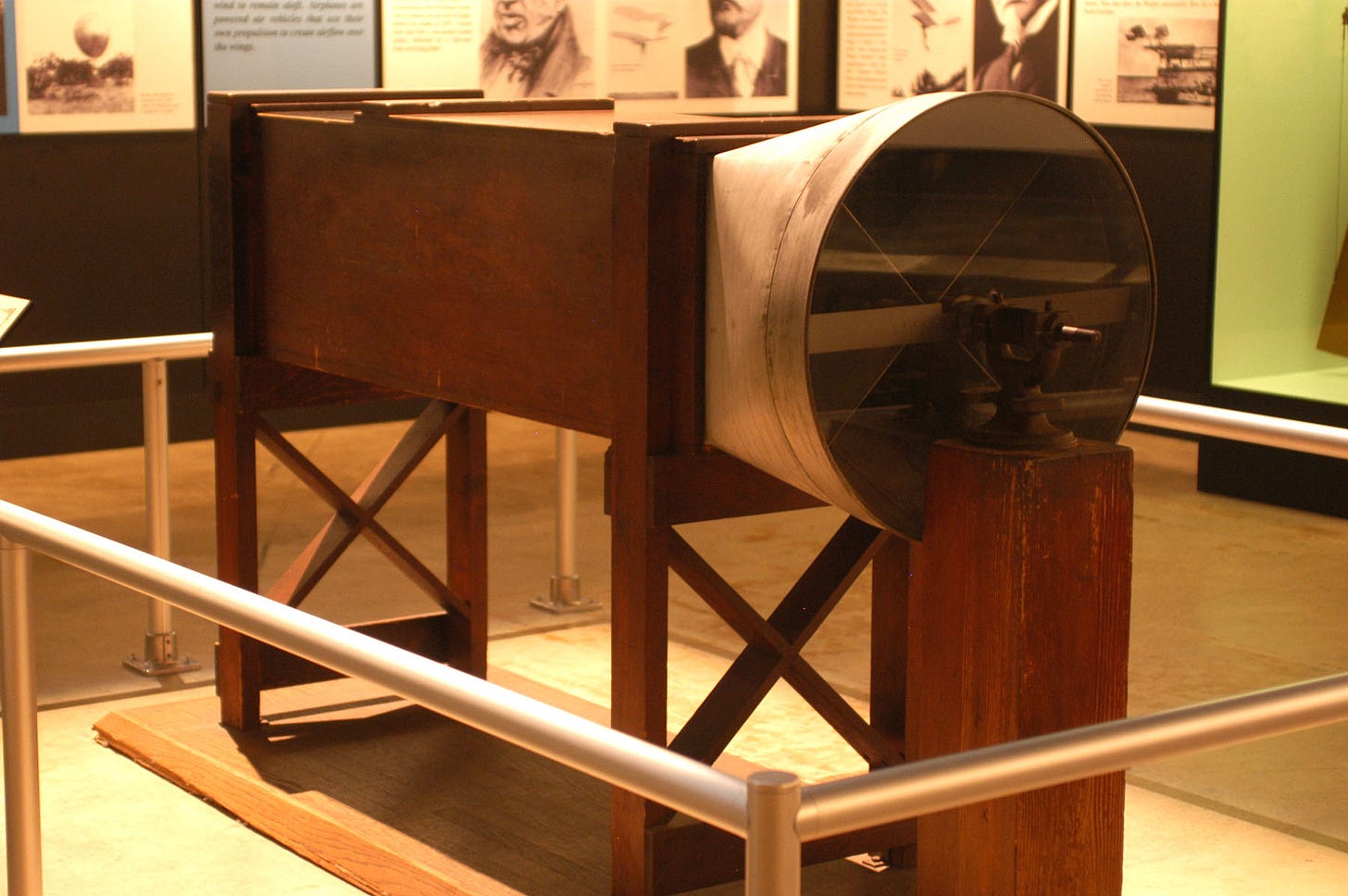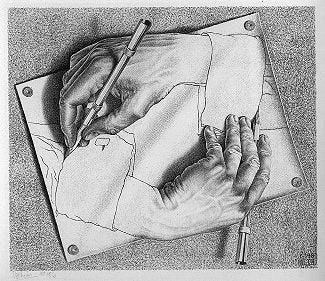Spastic Learning - Visualizing Bayes
Click Buttons Faster
When in the dark, explore as fast as possible. Sprint at the unknown. When working in a program I'm unfamiliar with, I find that I learn the fastest by experimenting spastically. I mean literally moving my hands faster, clicking buttons quickly and almost at random. The goal is to bump into structure and start to get a sense of where you are — a flat-out rejection to clean sheet paralysis.
A pro knows many routes to achieve an effect, so they smoothly move from step to step. A good teacher highlights the direct routing, explains why it works, and illuminates the obstacles that students are most likely to trip on. However, sometimes, we find ourselves without teachers to explain or pros to imitate.
The key addition to spastic exploration for efficient learning is the mandate to always retake good paths smoothly. Stumbling through the same straight path twice shows that you haven’t learned from the experiment. If you have already poked around a local region and uncovered a highway, you'll illuminate the map much more quickly by taking the highway to the next fog and stumbling around there instead. Later on, it will be worth exploring parallel paths, but the goal is never distance traveled, but new territory mastered.
Striving for more distance traveled is one manifestation of the general trap of measuring inputs (how many hours worked, how many dollars invested, how many jobs created) rather than outputs (skill accumulated and product generated by your study and labor, the capitalist’s return, the improvement in the public’s wellbeing).
Someone very skilled “makes it looks easy" because they have the routes rote. Expert users of any tool can still get stuck though, sometimes even as a cost of success. A traveler with a perfect map of a useful route is a valuable merchant. This is a perfectly good state to achieve, but re-running the same route means stopping at a local minimum (i.e. not exploring).
Improvement comes with another a psychological trap built-in. As a new explorer, your average speed is very slow due to tripping over roots, wandering through new neighborhoods, and bumping into trees. As you discover clearer tracks and retrace them more and more, you continue to accelerate. The trap is attributing that new speed purely to strength (global) rather than experience (local).
When you venture into a new forest expecting your strength to whisk you through, the trees and rocks turn out to be just as tough as in the last wood. Tripping and falling again are signs of a lack of experience, while, through an egoistic lens, they are signs of weakness. In reality, few have the strength to fight tree roots1 and nearly all would benefit from finding better routes.2
Luckily, speed isn't derived exclusively from local experience or highway shortcuts. There are useful, global skills which arm you for caverns and the open road. They can be discovered or taught and can be improved by reps in disparate domains.
Global Technique
Fundamental skills apply everywhere. The scientific method is a torch for the darkest cave, empathy is sustenance, and humility is a helmet that makes encounters with obstacles less painful.
Another meta-technique is actively choosing to learn a new skill. A great engineer from my college robotics team would find himself in a rut on CAD techniques. He was already the best designer on the team, but would intentionally set himself with a challenge to design something (often lower urgency, but still useful) in a different way — a profitable merchant stepping off the highway and into the thicket. He repeatedly came back, not only with treasure and the local experience of another road, but with tools applicable to other paths.3
This gives a chance to comment on the purpose of teams. Teams are entities aiming to optimize the set of routes for generation of the desired outcome.4 In this frame, success isn’t a point on the map, but the product of the complete set of travelers, tools, and roads that continually generate progress towards a goal outside the territory.5
Nature pursues this structure across many levels of life. However, you can choose where to direct the effort of structure from yourself and up. Choose wisely, learn, and build.
The Odds and Taking Advice
“Don’t trust advice.”
Cynical, ambiguously encouraging agency, and of Escherian aesthetic quality, the opening imperative must be tempered with priors.
The power of advice about what to do is proportional to the density of pitfalls, while advice about what not to do is inversely proportional.
There are massive biases in advice that depend on who is giving it, their outcomes, the underlying landscape, and the goals of the person receiving the advice. The mistrust of advice from the most successful people in the world likely stems from the fact that there was hardly anyone who could advise them up to the highest heights!
If the terrain is full of traps, it's better to be shown the narrow path to success. If the terrain has few hazards, it's more efficient to know what to avoid instead. I’ve illustrated each of the combinations below where the four left-most images represent different types of advice of similar value. In a highly lethal landscape you get a more informative (less compressible) update by learning one narrow path to success than by learning a hundred typical paths to failure.6

This Bayesian view is intuitively clear, but what about in technical domains?
In an exhaustive (Edisonian) search you simply try over and over again, gaining little insight from incremental rounds. Testing thousands of different filament materials was useful and scientific, but less transferrable (and charismatic) than the combined scientific and engineering process of the Wright brothers’ pursuit of flight.
The Wright brothers imitated the mechanics of birds and repeatedly iterated on their machines, but they ultimately succeeded, not by stumbling in the dark, but by learning the fundamental mechanics. The brothers invented the wind tunnel to systematically sweep the landscape of aerodynamics by conducting parametric studies of airfoils. Compared to the (Edisonian) Otto Lilienthal, the Wright brothers more efficiently traversed the aerodynamic subspaces of the problem and took fewer runs in the genuinely dangerous arena of flight test - the one that ultimately ended Lilienthal’s search.
This is all to say that in technical matters, the “odds” of success are merely another proxy anti-correlated with the narrowness of the precise, physical solution space.

Unity and a Prompt
The preceding sections are all united by Bayes, except one.
Transitioning from learning spastically to retaking paths efficiently is about being realistic with your prior knowledge.
Judging recommendations by the adversity that faced your advisor is again a simple calculation of a prior of their odds.
Lastly, parametric study of the falls into the framework when viewed as the next order7 on the progression from spaz toward retracing paths smoothly. Testing yet another filament candidate (with an effective experimental setup) is like methodically retracing your steps two paces to the left. Parametric study is intentionally walking to the left or right to understand why there are so many stumbling points.
Calibrating your priors for the landscape helps resolve when to explore, when to repeat, and when to study closer.
The one section of the essay that doesn’t fall cleanly into this pattern is global technique. You always want more of it, and it’s not blocked exclusively by having enough reps. Some techniques can be taught in minutes and resolve countless hours of puzzling or experimentation. Scientific methodology, intelligence, empathy, and humility come to mind. What global techniques (secrets) are most underdeveloped?
ORTHOGONALIST
I hear and also use language like "Person X is a strong engineer, thinker, etc." I like this language since it is ambiguous about whether it refers to some innate skill or something that needs reps. Every statement is also heard relative to its negation, so to the extent that it is heard regarding training, it encourages workouts that earn strength and experience!
Exception: If you are tripping over unnatural obstacles, whether they are barriers deployed by opponents or impediments unwittingly placed by allies, it may be optimal to figure out how to move a barrier.
Important: Natural and adversarial obstacles are fundamentally different.
Natural barriers make landing Falcon 9 a hard problem while adversarial barriers make self-driving even harder.
Reminder: Learning skills for the sake of a list of skills can be trap by itself! This is easily diffused by just making something in the process. If the skill is interesting or useful, you’ll have something to show for it. If what you are learning is too boring or inapplicable, it should be a self-arresting endeavor. Explore what interests you or produces something valuable!
I think I betrayed my confidence in the future of AI when I paused and rewrote this sentence to exclude the world “people.” I suppose many companies are more machine than man already. Tessier-Ashpool SA. Renaissance Technologies. Google.
Companies are networks of neural networks, the routers between them, and tools for engaging the physical world. Leaders often make standards to guide towards standard paths, but great leaders focus on teaching the fundamental tools that apply on all paths, including undiscovered ones.
The other category of caveats here is that the set of routes changes as a result of all other players. The game can then step out a level to optimize the optimization of routes and on and on. Future writing will cover my thoughts on this problem, which I call chain generality: What is the limit of utility of nth order optimization?
Peter Thiel’s conceit that “every moment in the history of business only happens once” is the limit case of this argument. This would mean that, despite whatever similarities exist in the basics of what to do and what not to do, nobody can deliver the critical insight to create a new monopoly based off of old successes.
0 : Spaz :: 1 : Forward :: 2 : Lateral
Remember, the only point of being spastic (or scholastic) is in service of going forward faster.
I wrote more about seeing levels of abstract concepts as orders in a previous essay:



